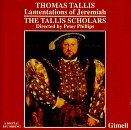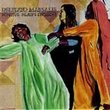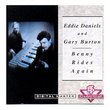| All Artists: Tallis Scholars, Phillips Title: Lamentations of Jeremiah Members Wishing: 0 Total Copies: 0 Label: Gimell UK Release Date: 9/15/1993 Genre: Classical Style: Opera & Classical Vocal Number of Discs: 1 SwapaCD Credits: 1 UPCs: 028945492520, 093046430924 |
Search - Tallis Scholars, Phillips :: Lamentations of Jeremiah
 | Tallis Scholars, Phillips Lamentations of Jeremiah Genre: Classical
This is the third disc the Tallis Scholars have devoted to their namesake composer--and unfortunately, it's the least successful. They bring their usual smooth, bright, pristine sound to music that calls for firm articulat... more » |
Larger Image |
CD DetailsSynopsis
Amazon.com This is the third disc the Tallis Scholars have devoted to their namesake composer--and unfortunately, it's the least successful. They bring their usual smooth, bright, pristine sound to music that calls for firm articulation and a somewhat darker color--they sound, frankly, like they'd rather be singing Palestrina. What's more, Phillips has transposed much of the music up (sometimes a fifth or more) in order to use his sopranos. Granted, they are wonderful singers, but using sopranos at a higher pitch in music where Tallis wrote the highest voice for an alto or high tenor changes the color of that music a lot--and not for the better. This is most damaging in the centerpiece of the disc (and Tallis's most famous work), the Lamentations of Jeremiah, which almost entirely loses the haunted, brooding quality that the Hilliard Ensemble catch so aptly on their ECM recording of these works. The other major work on the record is Salve intemerata, a lengthy prayer to the Virgin Mary with long, sometimes meandering melodies twisting around each other. The Tallis Scholars lose the music's forward momentum and sometimes seem to be droning on without the energy or interest that Chapelle du Roi brings to the work on their Tallis: Complete Works, Volume 1. You'd do better to listen to Phillips and his gifted singers in real Palestrina, which they sing peerlessly on their Live in Rome concert recording; to hear what they can do with Tallis at their best, try Spem in alium or the Christmas Mass. --Matthew Westphal Similar CDsSimilarly Requested CDs
|
CD ReviewsNothing lamentable here FrKurt Messick | Bloomington, IN USA | 01/18/2006 (5 out of 5 stars) "--Thomas Tallis-
Thomas Tallis, born in 1505, was one of the outstanding liturgical composers of his day, being the acknowledged master of the composers of England from the time of Queen Mary's reign forward. He was a composer and Gentleman of the Chapel Royal during the reigns of Henry VIII, Edward VI, Mary, and Elizabeth, and worked closely with many other composers, most particularly William Byrd. He was an organist in addition to composer. He died in 1585, having navigated his way through the tumultuous catholic/protestant difficulties of the church which provided his livelihood and creative outlet. --Lamentations of Jeremiah-- The Lamentations were most likely intended for use in Holy Week, but not as part of liturgical offices often performed during this time. They may have been compositions for private singing among Catholics officially suppressed, as some of Byrd's motets were found to be. This comes from relatively late times in Tallis' career. --Mean Motets and Treble Motets-- Other pieces included on this disc include eight of Tallis' motets. The first five (mean) motets are scored for MAATB; the second three for TrMATB. Despite this, all eight are quite similar in style, timing and intention. Like the Lamentations, these derived from liturgical texts, but deviate from the standard forms sufficiently to make one wonder as to their actual use, and are also late compositions. --Antiphon: Salve intemerata-- This piece undoubtedly derives from the early Tallis, from when Henry VIII was still a devout and loyal Defender of the Roman Catholic faith. Written perhaps as early as the 1530s, it is relatively old fashioned in style, with a five-part version. It is quite long and has a wide vocal range. --Liner Notes-- Being internationally acclaimed, the Tallis Scholars' CDs typically present their commentary and texts in English, French, German and Italian (together with any Latin texts); that is true of this disc. The cover art also typically represents visual arts contemporary with the compositions - here it is a portrait of Henry VIII, aged 49, by Hans Holbein, roughly contemporary with Tallis. --The Tallis Scholars-- The Tallis Scholars, a favourite group of mine since the first time I heard them decades ago, are a group dedicated to the performance and preservation of the best of this type of music. A choral group of exceptional ability, I have been privileged to see them many times in public, and at almost every performance, their singing seems almost like a spiritual epiphany for me, one that defies explanation in words. Directed by Peter Phillips, the group consists of a small number of male and female singers who have trained themselves well to their task. Their recordings are of a consistent quality that deserve more than five stars; this particular disc of pieces by Thomas Tallis, the namesake of the group, deserves a place on the shelf of anyone who loves choral music, liturgical music or Gregorian chant, classical music generally, or religious music. It is remarkable, both in composition and performance. The original recording was made in 1992 in the church of St. Peter and St. Paul, Norfolk, one of their favourite recording sites. " |

 Track Listings (11) - Disc #1
Track Listings (11) - Disc #1








